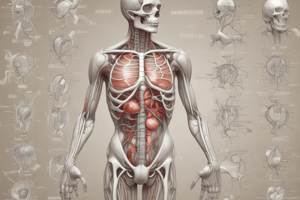Podcast
Questions and Answers
Which organ is a primary component of the cardiovascular system?
Which organ is a primary component of the cardiovascular system?
- Lungs
- Stomach
- Spleen
- Heart (correct)
What gland is primarily responsible for regulating metabolism in the endocrine system?
What gland is primarily responsible for regulating metabolism in the endocrine system?
- Ovaries
- Adrenal Gland
- Thyroid (correct)
- Testes
Which of the following is part of the digestive system?
Which of the following is part of the digestive system?
- Trachea
- Kidneys
- Pancreas (correct)
- Spleen
What organ is associated with the lymphatic system?
What organ is associated with the lymphatic system?
Which pair of organs is part of the urinary system?
Which pair of organs is part of the urinary system?
Flashcards are hidden until you start studying
Study Notes
Nervous System
- Cerebrum: Largest part of the brain, responsible for higher brain functions such as thought, action, and emotion.
- Cerebellum: Coordinates movement, balance, and posture; essential for motor control and learning new physical skills.
Endocrine System
- Adrenal Gland: Produces hormones like adrenaline that regulate metabolism, immune response, and stress reactions.
- Thyroid: Regulates metabolism through hormones such as thyroxine; influences growth and energy levels.
- Ovaries: Produce estrogen and progesterone, crucial for female reproductive health and regulation of the menstrual cycle.
- Testes: Responsible for producing testosterone, vital for male sexual development and sperm production.
Cardiovascular System
- Heart: Muscular organ that pumps blood throughout the body; ensures the delivery of oxygen and nutrients to tissues and removal of waste products.
Respiratory System
- Lungs: Main organs of respiration; facilitate gas exchange—oxygen intake and carbon dioxide expulsion.
- Trachea: Air passageway connecting the throat (pharynx) to the lungs; contains cartilage rings for structure.
Digestive System
- Stomach: Breaks down food using acid and enzymes; churns food into a semi-liquid form known as chyme.
- Liver: Produces bile to help digest fats; also processes nutrients and detoxifies harmful substances.
- Pancreas: Produces digestive enzymes and hormones like insulin, which regulates blood sugar levels.
- Small Intestine: Site of most digestion and nutrient absorption; consists of three segments: duodenum, jejunum, ileum.
- Large Intestine: Absorbs water and salts from indigestible food matter; compacts waste into feces for excretion.
Lymphatic System
- Spleen: Filters blood, recycles iron, and plays a role in immune system responses by storing white blood cells.
Urinary System
- Kidneys: Filter blood to produce urine, regulate fluid and electrolyte balance, and remove waste products.
- Urinary Bladder: Stores urine until it is excreted from the body; controls urination process.
Studying That Suits You
Use AI to generate personalized quizzes and flashcards to suit your learning preferences.




